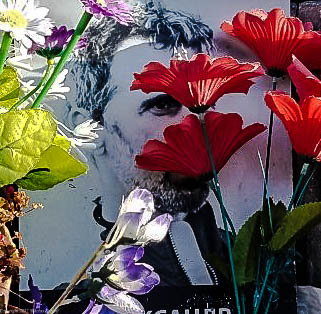
Maidan Year Three: Revolution Comes Full Circle Amidst Police Reform, U.S.-Trained Right Wing SWAT Force and Former Venezuela Ambassador
On the third year anniversary of the Maidan revolution, I’m holed up in Kyiv’s decidedly retro, Soviet-era Ukraina hotel. Located just a stone’s throw away from Maidan square itself, Ukraina is linked to the revolt against former president Viktor Yanukovych, for it was here that snipers may have shot at protesters from inside the hotel. In addition, during anti-government protests, police retreated along a street flanking the north side of Ukraina. In light of the prominent role played by security forces during Maidan, I want to get a clearer sense of the post-revolutionary government’s efforts at police reform. Given turbulent local history, it seems entirely appropriate to conduct my journalistic interviews within the drab hotel lobby itself.
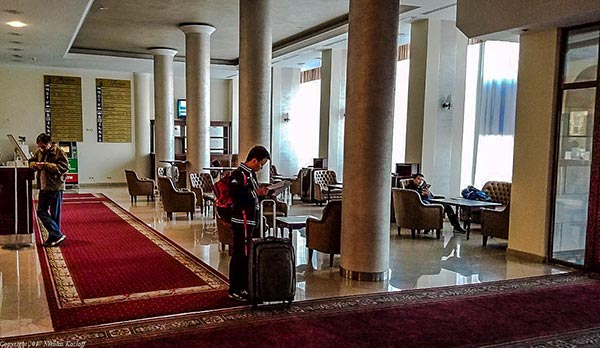
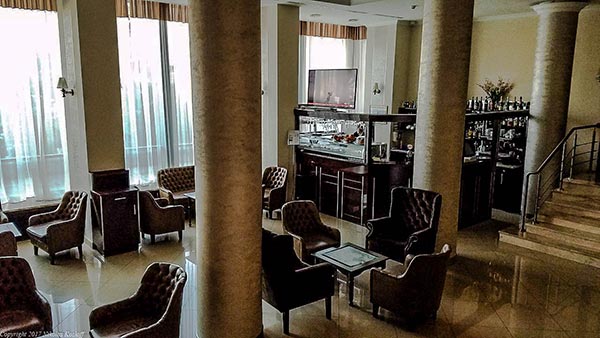

Presently, I’m greeted by young Denis Pilash, a veteran of political protest on the Maidan. Two years ago, on a previous trip, I interviewed Pilash, who along with his colleagues had sought to inject a note of independent, anti-authoritarian politics during anti-Yanukovych demonstrations. Police brutality, Pilash remarks, played an important role in sparking wider rebellion on Maidan. In late 2013, he notes, Maidan protest was quite mild and merely sought to protest Yanukovych’s plans to move Ukraine into a customs union with Russia as opposed to signing an association agreement with the European Union.
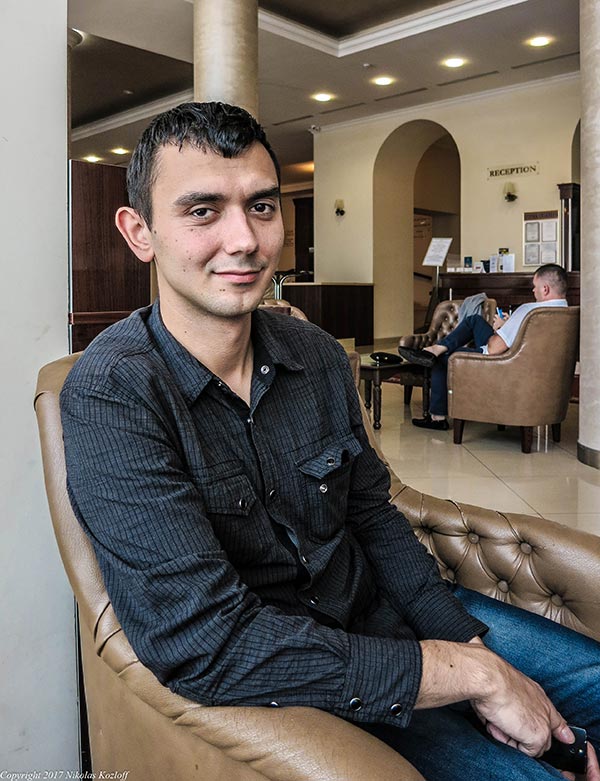
A key turning point, however, came on November 30th when the Berkut special police force led a violent crackdown on peaceful students. From this point onwards, protests became radicalized and focused more on eradicating the police state and police brutality, not to mention changing the underlying structures of power. Berkut’s crackdown, which targeted students but also journalists and some older protesters, was covered widely by the media.
Witness to Police Brutality
Police repression was notable for its sheer ferocity. That, at least, is the impression I get from speaking to Gennady Kanishthemko, owner of Bar Baraban just a couple of blocks from Maidan square. On the night of November 30th, Kanishthemko found himself at work very late at night. The owner’s staff had already left and the only souls remaining were Kanishthemko and a Danish journalist surfing the internet. Suddenly, the reporter heard that police had descended on student protesters on the Maidan and the Dane dashed out of the bar.
A half hour later, the journalist stumbled back into Baraban, his face beaten to a bloody pulp by local police. By that point, it was already three in the morning, and students began to show up at Baraban seeking shelter. “They were sure the police would arrest or even kill them,” Kanishthemko says. Turn out the lights and lock the door immediately, pleaded the students. All too willing to oblige, Kanishthemko let the students spend the night in his bar.
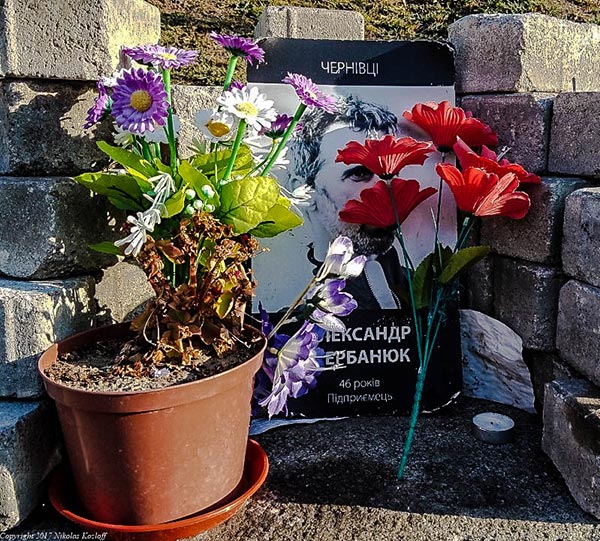
Needless to say, Petro Poroshenko’s post-Maidan government has on the surface at least made some effort to rein in and reform the reviled police establishment. Aside from their sheer brutality, Ukrainian police have been notorious for demanding money. Take, for example, the country’s traffic police who were “widely viewed as uniformed bribe-takers who shake down regular drivers for minor or non-existent offences while allowing those with money and influence to flout the law.” After a new parliament was elected in 2014, a draft law on police reform was submitted. As part of the initiative, the authorities disbanded Kyiv’s entire traffic police corps and later replaced it with a new and retrained force.
In the long-term, Kyiv seeks to completely overhaul the law enforcement culture and to replace 80 percent of police personnel within five years. Fresh recruits, many of whom are motivated and inspired by the Maidan revolution, are required to take classes on criminal law and respect for gay rights, which represents an improvement over previous history. Previously relegated to clerical jobs, women now constitute about one quarter of the new police force (the old traffic police was almost entirely male). Additionally, officers now earn higher salaries, and the old bribe-taking road police have disappeared.
The proprietor of Bar Baraban is cautiously optimistic about new reforms. Three years ago, he tells me, the police routinely stopped him because of his physical appearance. “I look like I have ethnic roots from Georgia or Chechnya,” Kanishthemko says, “because of my nose and beard. There are a lot of illegal folk from there and this causes suspicion. The police would stop me in my car and demand a bribe. You could either pay up or alternatively spend a few hours ‘explaining the situation.’” Recently, however, the bar owner hasn’t had any problems with the police. To be sure, there are still some bad apples hanging over from the previous police regime, and “not everything is going smoothly in police reform.” Nevertheless, Kanishthemko says the system is changing for the better.
A “Nice Façade”
Not everyone shares such an optimistic outlook, however. Back at hotel Ukraina, Pilash is perplexed how a mass movement which had originally sought to topple a police state could have paradoxically morphed into calls for new and trendy police rebranding. On the streets of Kyiv, police recruits sport new uniforms and equipment. Passers-by have even taken selfies on their cell phones with the police. Officers are young and physically fit, unlike their “balding pot-bellied predecessors.” At times, police reform, which has been associated with a social media campaign called “My new police,” has almost taken on a “gimmicky” air. Associated press remarks, “good looks sometimes seem like a prerequisite for the job – giving the initiative the air of a publicity stunt, one of the criticisms leveled at the reform.”
For Pilash, the new police reform — widely touted in Ukrainian media circles — is nothing more than a “nice façade.” The upper middle class of Kyiv is enthralled by police reform, expensive outfits and selfies, but ultimately Ukraine has turned its back on the original spirit of Maidan. Even more seriously, concerns have been raised about lack of proper oversight. According to Foreign Policy magazine, police reform has been a top-down affair, with a few influential officials leading the process without much input from the public. “What we learned at Maidan,” Pilash declares, “is that police really has to be controlled by civil society.”
In addition, while new recruits may have spanking new outfits, they’re a little green and that is putting it somewhat charitably. At a café located near Kyiv’s opera house, I meet Pavlo Kutuev, professor of politics and sociology at the city’s Polytechnic Institute, who is concerned about the high profile assassination of Pavel Sheremet, a pioneering journalist who was recently killed just a few blocks from where we sit in the café. Sheremet, who frequently criticized anti-corruption investigations and the authorities, was known for raising human rights concerns. As Sheremet drove his car in broad daylight and entered an intersection, an explosion ripped through his vehicle. Authorities say the journalist was killed by a homemade explosive device that may have been detonated remotely. The likely motives in the killing still remain unclear, though colleagues believe Sheremet’s assassination was payback for his tireless work.
The fact that authorities haven’t been able to apprehend the perpetrators shouldn’t surprise anyone, Kutuev tells me, since there’s a tangible “lack of professionalism” within the new police. The attackers, who brazenly detonated their device without fear of CCTV cameras, weren’t intimidated by the police, Kutuev declares. “At the beginning of the police reform,” the professor remarks, “there was a lot of enthusiasm but now the effort just looks ridiculous and even dangerous while some feel a sense of disillusionment.”
Empire Strikes Back?
Yegor Stadny, another veteran of Maidan student protest, has also grown disenchanted. Since the Maidan revolution, Stadny has gone on to become Executive Director of CEDOS, a Kyiv think tank focusing on educational policy. Essentially, he says, anti-corruption calls stemming from Maidan have been frustrated. While it would be an exaggeration to say the Poroshenko government has launched a “counter-revolution,” Stadny says the situation is more akin to the Empire Strikes Back. “The old guard didn’t return,” he says, “but at the same time there has been a step back or many steps back in terms of the anti-corruption fight. We are facing problems not just with law enforcement reform, but also tax reform as well as educational reform.”
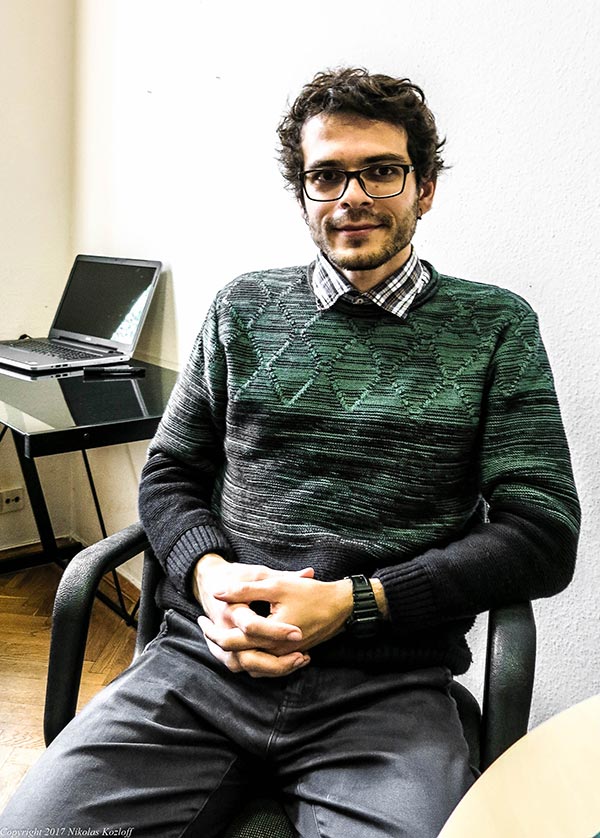
Specifically, Stadny explains there has been resistance to reform within the ranks of the police’s department of internal affairs. The new traffic cop roll-out was “ridiculous with these selfies and social media.” Stadny adds that it’s not just local metro police which needs to be reformed but also detectives, Special Forces and many other units. Unfortunately, however, reform of these bodies has basically stopped.
At the Ministry of the Interior meanwhile, it’s a little bit of “meet the new boss, same as the old boss.” Leading the agency is none other than Arsen Avakov, a former governor of Kharkiv who also served as an MP during the Yanukovych era. “Avakov is one of the few figures who haven’t changed from the pre-Maidan days,” Pilash says, adding that the minister’s close circle condones police impunity and favors arming ranks to the teeth. Such heavy-handed and draconian approaches to law enforcement would seem to be at odds with the original Maidan revolution.
Even worse, the Ministry of Interior plans to organize a SWAT force which is being organized behind closed doors. The new force is supposed to replace the hated and reviled Berkut, responsible for beating protesters on Maidan square, though some may wonder whether history is simply repeating itself. According to Foreign Policy, activists are worried that a new, militarized police force could be used to brutally crack down on protesters, just like before on Maidan square.
CHiPS Head to Ukraine
Further questions surround foreign-based support for the police reform. The U.S. has provided instruction to Ukraine’s new traffic police through the Department of Justice and the Bureau of International Narcotics and Law Enforcement Affairs (I.N.L.). Washington has contributed $15 million to the effort, which will take from five to ten years to complete. In addition to the training, Ukrainian officers received American-style uniforms which have prompted jokes that new recruits look like characters from the Hollywood comedy Police Academy. As if such comparisons weren’t outlandish enough already, Ukrainians may wonder whether their police have gone back in time to the 1970s-era TV show CHiPS, since the California highway patrol no less is providing instruction to recruits.
As if the notion of CHiPS headed to Ukraine isn’t outlandish enough, it seems the California highway patrol’s mission may blur the line between policing and politics. According to Slate, CHiPS have been deployed to the southern Ukrainian city of Odessa where they will train a new police force. Odessa, a Black Sea port, holds key strategic and political importance since it lies near Russian-annexed Crimea to the south. In 2014, the city witnessed violent civil strife when clashes between pro-Russian and pro-Ukrainian groups resulted in the deaths of 40 people.
In light of the restive history, a successful police overhaul in Odessa is evidently seen by Kyiv and Washington as a top priority. Indeed, U.S. Ambassador to Ukraine Geoff Pyatt has hardly concealed the underlying political nature of the policing mission in Odessa. “Ukraine today,” the diplomat noted, “is fighting two wars. One is the war with Russia…The other is the war against corruption, the war for reform, the war to move Ukraine towards the standards of modern European democracy… California Highway Patrol will be trainers helping to establish a new Odessa Patrol Police… a force which is professional and, most importantly, un-corruptible.”
From Ferguson to Kyiv Ministry of Interior
The U.S. is working with Minister Avakov of the Interior Department, which has also raised eyebrows. Foreign Policy writes, “International donors who have partnered with the Interior Ministry risk repeating a problem that has plagued similar efforts to clean up law enforcement in other parts of the world. All too often, donors tend to give their help to corrupt and autocratic political elites still mired in militarized and secretive systems.” The magazine adds, “In a repeat of the patrol police project, only a closed circle of ministry officials and U.S. donors are involved in designing the new [SWAT] force.”
Judging from reports, a troubling overlap may have emerged between policing and the military. Indeed, Ukrainian SWAT forces, which will be trained by Texas Rangers and U.S. Special Forces, will be militarized. In light of widespread police brutality in the U.S. from Ferguson to Staten Island and beyond, as well as historic repression of the African-American community and growing militarization of the police force, some may note the seeming perverseness of Washington pushing its own version of police reform abroad in the first place.
Others question whether outsiders really know what they’re doing. Writing in Kyiv Post, Ukrainian MP Igor Lutsenko remarks, “The peculiarity of Ukraine is that foreign experts work on the positions that require tons of experience in police activity as well as deep knowledge of Ukrainian conditions. It is difficult to imagine how it is possible to effectively manage police, for instance, in the United States or Moldova or Georgia without knowledge of local language and local legislation.” Other reports suggest new cadets may lack sufficient training, with only ten weeks of U.S.-assisted training under their belts before getting sent out into the field.
Minister Avakov’s Questionable Ties
As if all of this wasn’t questionable enough, serious questions must be asked about U.S. point man Avakov and the latter’s underlying political allegiances. Reportedly, soldiers who have served on the front lines in Ukraine’s east will be given preference in the new SWAT force. Meanwhile, the Ministry of Interior works in tandem with so-called “Azov Battalion,” a group of right wing paramilitary fighters who have been battling Russian separatists. Hardly ashamed of their politics, Azov Battalion members openly sport military insignia associated with Nazi Germany. Azov is run by an extremist patriot group which considers Jews and other ethnic minorities “sub-human,” and the outfit has called for a white Christian crusade against such minorities. Daily Beast remarks that “The Azov Battalion not only answers directly to the Ministry of Interior, but it is ingrained deeply in that structure. The founder and head of Azov, Andriy Biletsky works closely with the Ukrainian Ministry of Interior.”
According to Anton Shekhovtsov, a visiting fellow at the Institute of Human Sciences in Vienna and an expert on Ukrainian politics, Avakov has displayed some questionable, long-standing ties to the far right. The academic points out that Avakov appointed Vadym Troyan as head of the Kyiv regional police. Troyan is a deputy commander of Azov Battalion and also a top member of “Patriot of Ukraine” or P.U., a neo-Nazi group. Why is Avakov promoting such dubious figures as Biletsky and Troyan? Shekhovtsov says the Minister has had longstanding ties to the P.U. going back to Avakov’s earlier stint as governor of Kharkiv. Avakov, Shekhovtsov writes, “seems to believe in the personal loyalty of the P.U.-led Azov battalion and may use them as his ‘private army’ for business or political reasons.” Going yet further, the expert notes “the problematic relationship between the Ministry of Inferior and the neo-Nazis is undermining the credibility of the newly formed Ukrainian government internationally and domestically.”
From Venezuela to Ukraine
As if this story could get no more bizarre, the former U.S. Ambassador to Hugo Chávez’s Venezuela has overseen much of the police reform in Ukraine. From 2004 to 2007, William Brownfield had a combative relationship with leftist Chávez, who threatened to boot the diplomat out of Venezuela for “provoking” his people. A militaristic career diplomat, Brownfield is a graduate of the National War College who has been advising nations on police reform for twenty years. He’s also worked as a political adviser to U.S. Southern Command, the bête noire of the Latin American left. As Assistant Secretary for International Narcotics and Law Enforcement Affairs at the State Department, Brownfield has been advising Ukraine on its police shakeup. It’s a post of some significance, since I.N.L. manages more than $4 billion in more than 80 countries and programs are overseen by 5,000 employees and contractors.
Brownfield is the last person Ukraine should be turning to in its efforts to overhaul the police. During his stint in Venezuela, and later Colombia from 2007 to 2010, the diplomat allied himself with right wing forces intent on pursuing militaristic policies. Rather than mollifying tempers in the wake of the April, 2002 anti-Chávez coup, which might have received support from the Bush White House itself, Brownfield ratcheted tensions up further [for a fuller account of these developments, see my first book]. In Caracas, Brownfield did his part to diplomatically roll back the Chávez wave behind closed doors. One of the more Machiavellian diplomats to emerge from the WikiLeaks cables, Brownfield supported the U.S. Southern Command’s maritime surge into the Caribbean as a show of force. Brownfield then put his foot in his mouth by claiming Venezuelan authorities had not done their utmost to stem the flow of drugs into the U.S. In response, Chávez called Brownfield a liar and claimed that Washington was using the drug war as a pretext to intervene in Latin America. Not stopping there, officials then accused the ambassador of meeting with secessionist and rightist forces in the Venezuelan oil zone. When Brownfield made frequent trips to Chávez slums to dole out donations, the authorities threatened to boot the ambassador out of the country. At one point, Brownfield’s motorcade was even pelted with eggs.
Moving on to Colombia, Brownfield immediately felt more at home with the rightist U.S.-backed government in Bogotá which was in the midst of pushing counter-insurgency and the drug war. The Council on Hemispheric Affairs notes, “the close relations between the U.S. and Colombia are evident in the Ambassador’s approach to the Uribe administration, which appears to be the reverse of his approach to Chávez: Brownfield consistently champions the successes of the Colombian government, while deemphasizing its failures.” For example, Brownfield touted the government’s “strategic” bombing campaign of rebel-held positions. Though the authorities’ heavy-handed approach to solving political and social problems had undoubtedly hit a few “bumps in the road” along the way, nevertheless the government’s militaristic approach had been an overall success, Brownfield declared. The BBC, however, notes that the ambassador’s euphemistic “bumps in the road” amounted to “serious war crimes by the Colombian military.”
Ukraine’s Unenviable Position
Read the WikiLeaks cables, and the extent of the failed U.S. war on drugs quickly becomes apparent. Just why Kyiv would join forces with the likes of Brownfield, who has been so integrally involved in such militaristic U.S. policies, is rather befuddling. Yet over in Ukraine, the authorities are working in tandem with Brownfield’s I.N.L. and the D.E.A. to set up a new SWAT force. To hear Brownfield speak, for example during a recent press conference which addressed Ukraine policing, one might come away with a very upbeat impression indeed. Police reform, Brownfield noted, is “conceivably the coolest success story in Ukraine over the last two years.” Going further, the diplomat opined enthusiastically that the U.S. could work with Ukraine in order to create “one single specialized police unit with SWAT and crowd and riot control capabilities.”
Surveying the course of police reform, with the likes of Brownfield and Avakov at the helm, Ukrainians might wonder how their Maidan revolution has seemingly come full circle amidst the seeming consensus around militarized security forces. With just about two weeks to go before Donald Trump’s inauguration, however, it’s not clear whether the U.S. will remain committed to Ukrainian police reform, let alone provide diplomatic, political or even military support for Kyiv in the first place. Indeed, if Trump makes good on his comments Washington may seek to cut Ukraine loose altogether in the interests of making “deals” with Moscow. What’s more, Trump may roll back police reform in the U.S, let alone Ukraine. Confronted with such a bewildering situation, Ukrainians may wonder if it’s time to oversee their own police reform, without the assistance or “expertise” of outside nations.
(Note: for a version of this article with embedded relevant sources, see here).

Leave a comment